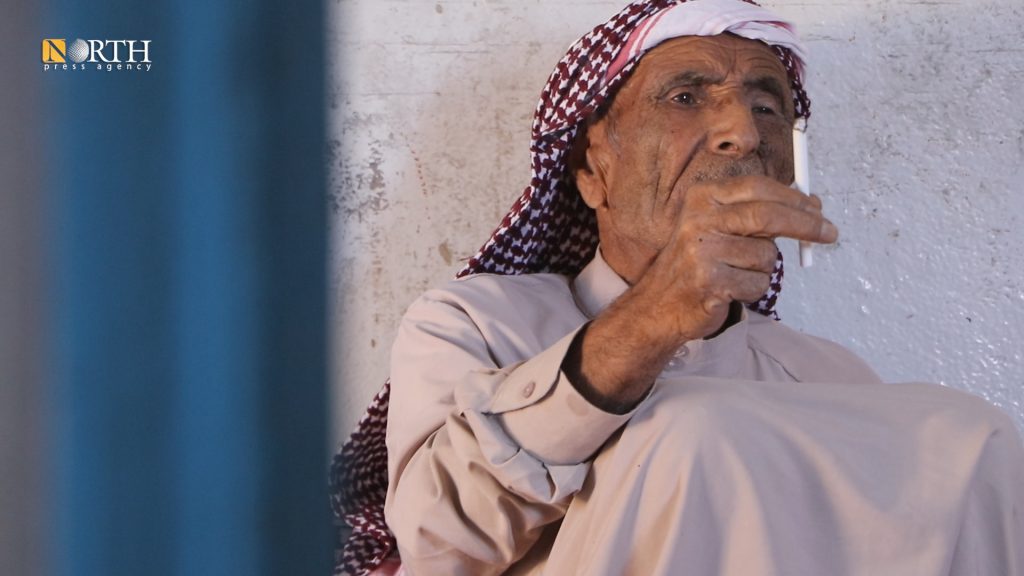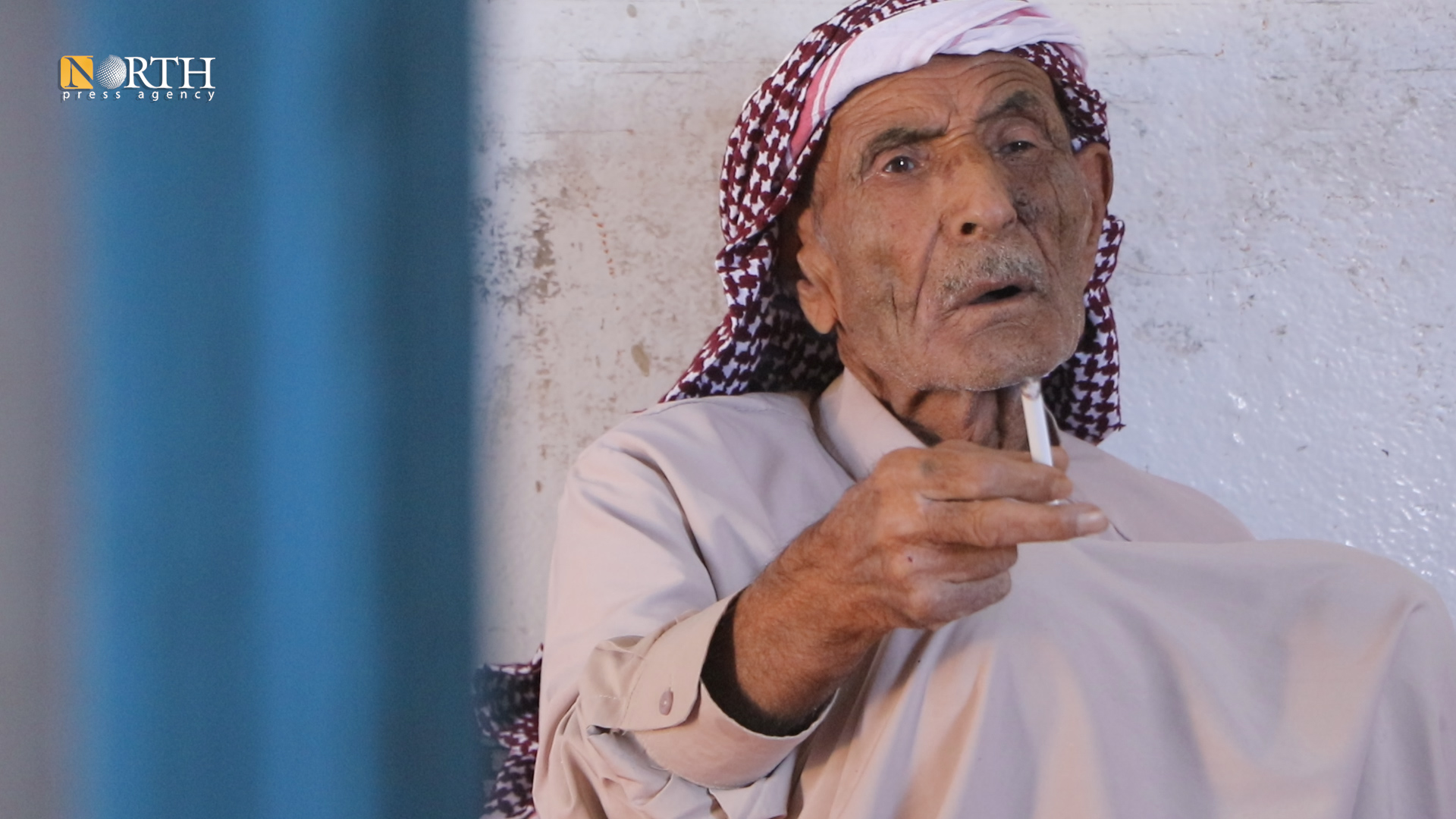HASAKAH, Syria (North Press) – The 80-year-old Mahmoud Sheikho Meshi expected to spend old-age in comfort and prosperity after years of work and hardship, to live safe in the house he inherited from his ancestors, surrounded by his children and grandchildren.
However, Turkey’s invasion of his city of Sere Kaniye (Ras al-Ain) caused his displacement with his family, while the neighboring country [Turkey] continues to threaten and target.
The Turkish offensive on the regions of Sere Kaniye and Tel Abyad, accompanied by the Turkish-backed armed Syrian factions, caused the displacement of about 300,000 civilians, according to the statistics of the Autonomous Administration of North and East Syria (AANES).
For two years in row, the elderly man has lived in extremely difficult conditions in a shelter for the displaced (school building) in the city of Hasakah, northeastern Syria.
He now wonders about Turkey’s right to launch wars of extermination throughout history and to continue threatening the regions adjacent to its borders.
After years of military operations on Syrian territory, Turkish threats and targeting the areas of AANES have not stopped.
Turkey’s threats and attacks, which began since the establishment of the AANES, continued even after the regions of Afrin, Sere Kaniye and Tel Abyad were occupied under the pretext of establishing safe zone, which was refuted by local and international human rights reports.
ISIS still on our lands
The elderly man, who suffers from health problems, lives with his family of four at Fawaz Joly School in Nasarah neighborhood in Hasakah.
He does not know what has happened to his house and property there in his city, which Turkey seized two years ago and handed over the fate of its remaining residents to the armed factions, that UN investigators’ reports described their violations as may amount to war crimes.

“We do not know whether our houses are damaged or not, abandoned or there are strangers residing in. God only knows.”
In earlier phases of the Syrian war, Turkey bartered areas of Syria that were held by the opposition for areas inhabited by Kurds, Arabs and Christians in northeastern Syria.
The fate of Sheikho Meshi’s family was the same as of 300,000 displaced people after the Turkish offensive in 2019.
At that time, many of them went to camps established by the AANES or to shelters that were said to be temporary, while others were distributed in the cities and towns of north and east Syria.
The elderly man said he and his brother owned houses, shops and vehicles in Sere Kaniye.
“If I have to choose between tons of gold and to return to my land, I will choose to return to my homeland.”
He further explains “We cannot return, we have nothing to say, since ISIS [Turkish-backed opposition groups] and the Turks are still on our lands.”
Many incidents indicate the presence of leaders of al-Qaeda and ISIS among the Turkish-backed factions or under their protection.
On October 23, the US forces announced, through a statement, the killing of al-Qaeda leader Abdul Hamid Matar in an air strike.
Two days later, a UAV, believed to be American, targeted the prominent leader of ISIS, Sabahi al-Ibrahim al-Masleh, known as Abu Hamza al-Shuhail, to be killed along with two of his companions in the village of al-Adwaniyah in the Sere Kaniye countryside.
The city of Sere Kaniye had previously witnessed the raising of ISIS flags during a protest by residents against the French presidency’s position on the cartoons of the Prophet Muhammad, in October of last year.
“If we were reptiles, we would eat soil”
Away from their homeland, Meshi with his family live in a classroom at the end of the school corridor in Hasakah, where they built a wall in the corridor to gain additional space and obtain some privacy.
The head of the family recalls what happened the day the Turkish army attacked and the bombing of the city intensified, “At 04:00 it started shelling us, residents hardly managed to flee the shelling, some fled on bicycles, three-wheeled motorcycle, cars ,I fled with this dress on my body.”
Sere Kaniye IDPs spend their days amid deteriorating living conditions and scarcity of relief aid, whether in the form of food, medicine, heating fuel and other necessities.
The number of shelters for Sere Kaniye IDPs in the city of Hasakah and its countryside decreased from 81 to about 45 schools, after nearly half of the IDPs moved during the current year to the Sere Kaniye camp on the eastern outskirts of the al-Tala’i neighborhood on the eastern side of the city.
But the rest in these centers complain about the AANES focusing its relief efforts in the camps, while the Syrian Arab Red Crescent, the Saint Ephrem Association and the Blumont Organization provide food, detergents, water and bread in scarce quantities.
On September 8, 2020, Sere Kaniye Camp, which was established at the beginning of 2020, received IDPs from Sere Kaniye and its countryside who were previously residing in the schools of the city of Hasakah.
The camp includes 2,640 tents; in which 2,200 families, including 11,642 people reside, according to the camp administration.
Washokani Camp, which was established following the Turkish invasion of Sere Kaniye in 2019, includes about 13,000 IDPs from Sere Kaniye and its countryside.
The elderly complained “We do not receive basic food products. If you can tell them, ask them why they do not provide us with international aid as those IDPs residing in the camps.”
“Do not we have mouths to eat? If we were reptile, we would eat soil. If we were animals, we would eat hay.”
“Our conditions in Sere Kaniye were very good .We witnessed relaxing conditions and food was available, our livelihood conditions were good at all levels until the Turks shelled us,” he added.
The regions of northeastern Syria are suffering from the scarcity of UN aid, which the Autonomous Administration attributed to the continued closure of the Ya’roubiyah humanitarian crossing due to the Russian veto, and the politicization of the aid issue by the Syrian government.
Who gives Turkey the right to do so?
In the same room, the 65-year-old Farida Mohyeddin, the wife of the elderly brother, who came from Kobani to visit the family after being separated by displacement, is crying whenever she remembers her city of Sere Kaniye.
She said Sere Kaniye, where she lived for 40 years after her marriage, still contains the remains of her husband and her martyred son, who left five children behind.
Sheikho Meshi believes that Turkey continues its historical policies against the Kurds and the peoples of the region, “Turkey has no right to what it practiced against us. Who gives it the right to do so?”
Turkey accuses the Kurds in Syria and the AANES of being an extension of the Kurdistan Workers’ Party (PKK), which is banned by Ankara, while the Kurds accuse it of not stopping its policies against them.
Turkey had previously invaded Afrin region, north of Aleppo, which was administered by the AANES, causing the displacement of the population and looting of their property by the Turkish-backed armed factions.
Meshi goes back to history “In 1916, Turkey slaughtered two million Christians. With what right did it do that?”
He also added “In 1924, Turkey displaced Kurds from Turkey’s Bitlis, Van, Hakkari, and Siirt; with what right did it do that?”
Kurdish politicians believe that Turkey narrows down the Kurds in Iraq from time to time, and that it will antagonize them even if they are on other planets, according to the former deputy in the Turkish parliament Osman Baydemir.
The current predicament of the Syrian Kurds lies in their unwillingness to return to the pre-2011 phase, after they expelled the militants of the extremist factions from their areas after the escape of the government forces.
The AANES demands Damascus to maintain a form of decentralization, and to grant privacy to the SDF.
In late September, the president of the Executive Committee of the Syrian Democratic Council (SDC), Ilham Ahmad expressed the Syrian Democratic Forces’ readiness to dialogue with Turkey and to resolve all disputes with it through peaceful means and dialogue.
She added that this is in exchange for ensuring the handling of issues related to the Kurdish people and the occupied Syrian territories by Turkey, such as Sere Kaniye (Ras al-Ain), Tel Abyad and Afrin.
Although the new US administration stressed during the previous period its support for stability in the northeast Syria, this did not prevent the recent Turkish aggressions continuing in plain view of both the US and Russia, according to statements by the Autonomous Administration and the SDC.
Waiting for a permanent solution to the Syrian crisis, including the issue of the Kurds and the communities of the northeast, Mahmoud Meshi and the other IDPs will remain away from their homes and properties because of the presence of the Turkish-backed opposition factions.

